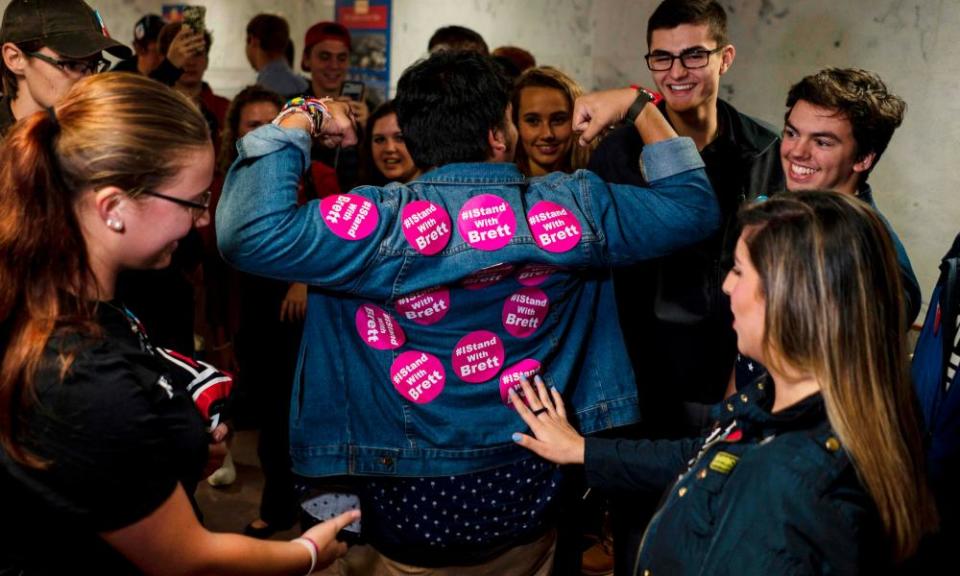'Brett bounce': what does the confirmation battle mean for the midterms?
Republican enthusiasm has surged in recent weeks, but that might not be predictive of voter turnout

When the curtain rose on the internet on Thursday morning, the stage was filled with stories about how Republican voter enthusiasm had spiked in outrage over the treatment of supreme court nominee Brett Kavanaugh.
The “Brett bounce”, Axios christened it, anticipating a potential windfall point or two for Republicans in November’s midterm elections. Slate noticed that Republican women in particular seemed to be invigorated by Kavanaugh’s tribulations at the hands of Senate Democrats. McClatchy spoke with three Republican pollsters: all reported soaring enthusiasm among GOP respondents after months of apathy and malaise.
For progressives, the news set off every alarm. Anger that Dr Christine Blasey Ford’s allegations of sexual assault had been reduced to the horse-race question. Distress that anyone could react to her testimony – and to the manifest petulance of Kavanaugh’s response – that way. Anxiety that the midterms could be squandered. Panic about a classic Democratic own-goal. Anger again at the effort to silence and punish Ford.
A week earlier, Kavanaugh had been dragged, metaphorically kicking and literally screaming, through hours of questions about the Ford allegations and other alleged conduct. In the immediate aftermath, most, including Donald Trump, declared Ford to be credible.
But Kavanaugh called it “a calculated and orchestrated political hit”, fueled by a desire for “revenge on behalf of the Clintons and millions of dollars in money from outside leftwing opposition groups”.
It was the same language of grievance and victimhood – at the hands of China, or immigrants, or trade agreements, or Barack Obama, or the rigged system, or indeed the Clintons – that Trump used so fluently to harness a wave of political support in 2016. And, apparently, core Republican voters still responded to it.
A NPR/PBS NewsHour/Marist poll released on Wednesday showed them up to about even with the Democrats.
“The result of the [Kavanaugh] hearings, at least in the short run, is the Republican base was awakened,” said Marist director Lee Miringoff.
But is the Brett bounce real – or does it look more like a bubble?
It is important to note, as New York Times reporter Maggie Haberman did straight away on Twitter, that the midterms are still a month away. In politics, that’s a very long time.
The decisions voters make in the booths – or about whether to vote at all – do not always represent the terminus of a smooth arc, passing evenly through an ordered progression of viewpoints. How voters say they feel right now, especially about their own levels of enthusiasm, might just not be all that predictive.
Kavanaugh was expected to face a confirmation vote on Saturday. If he is confirmed, Republican hackles might settle. Democrats might be motivated.
And there were reasons to doubt outright that the much-touted Republican enthusiasm spike was real. Washington Post reporter Dave Weigel pointed out that the supposed spike had not registered in senatorial races in Michigan, Pennsylvania and Wisconsin, three states Trump flipped to win. In each case, Democratic senators seeking reelection appear to be holding comfortable double-digit leads.
FiveThirtyEight founder and analyst Nate Silver wrote that there appeared to be a signal in the polling noise, but it was kind of weak.
“There is truth in the idea that Republicans have had a decent week of polling, but it can also be exaggerated by cherry-picking data that’s consistent with a particular narrative,” he wrote.
In short, Silver said that during the hearings Democratic senator Heidi Heitkamp’s reelection bid looked to have suffered in North Dakota, where Kavanaugh is popular. That could diminish the Democratic chances of taking the Senate from the 25% baseline where FiveThirtyEight’s model has had them for awhile to somewhere closer to one in five.
Cue Weigel again, with a “molten hot take”: “Heitkamp’s polling dip has less to do with Kavanaugh (whom she had not taken a position on before the bad polls) than with rising Trump [numbers] in ND, related to good news about the trade wars, which are front page stories in the state.”
In House races, Silver wrote, Republicans appeared to be doing better than a week ago but worse than a month ago. “District-level polls have generally been getting worse for Republicans, even if national indicators have stabilized or improved slightly,” he said.
Silver concluded that victory over Kavanaugh could lead to defeat in November: “whichever party doesn’t get its way on Kavanaugh will have more reason to feel aggrieved – and perhaps more motivation to turn out to vote.”
With both Republican senator Susan Collins and Democratic senator Joe Manchin announcing Friday afternoon that they intended to vote for Kavanaugh, that aggrieved party looks unlikely to be the Republicans. Shortly after the double announcement, veteran GOP strategist John Weaver tweeted: “Folks, coming to an election near you: a giant blue wave.”
Maybe. Many Democrats feel the stakes in the Kavanaugh confirmation fight were higher than the stakes in the midterms. The midterms might have important implications for the next couple years of the Trump presidency. The confirmation of Kavanaugh, who is only 53 and will assume a life term, could potentially have more important implications for longer.
The political calculus, in other words, is complicated and opaque. Kavanaugh is set to go down in history as a supreme court justice. The election is on 6 November.

